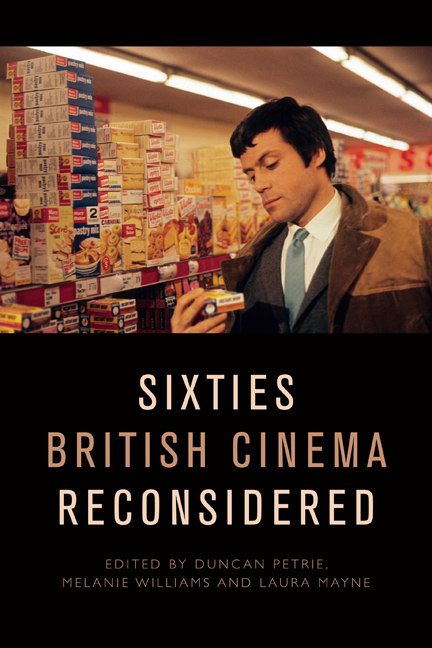Book contents
- Frontmatter
- Contents
- List of Figures and Tables
- Notes on the Contributors
- Introduction
- PART ONE STARS AND STARDOM
- 1 Male Stardom in 1960s British Cinema
- 2 ‘Rebel Rebel’?: Oliver Reed in the 1960s
- 3 Carol White: The Bardot of Battersea
- 4 ‘The Old Wave at Work’: The Transatlantic Stardom of the British Character Actress in the 1960s
- PART TWO CREATIVE COLLABORATIONS
- 5 Woodery-pokery: Charles Wood’s Sixties Screenwriting
- 6 ‘Beyond Naturalism’: Jocelyn Herbert, If . . . (1968) and Design for Performance in 1960s British Cinema
- 7 Kes: From Page to Screen
- 8 ‘I’d like to remember you as you are – as just a grumpy old man’: Joseph Losey and the Making of Figures in a Landscape (1970)
- PART THREE STYLE AND GENRE
- 9 ‘Wholesome rough stuff’: Hammer Films and the ‘A’ and ‘U’ Certificate, 1959–65
- 10 Widescreen Pyrotechnics: Shot Composition and Staging in the Cold War Films of Joseph Losey and Sidney J. Furie
- 11 The Rise and Fall of the Colourful Corporate Fantasy in 1960s British Cinema
- 12 Witchfinders and Sorcerers: Sorcery and Counterculture in the Work of Michael Reeves
- PART FOUR CULTURAL TRANSFORMATIONS
- 13 ‘An Impulse of Anger, Instantly Regretted’: Rebellion and Reaction in the Early-1960s Naval Film
- 14 Narratives of Race and Identity in Sixties British Cinema
- 15 Panic at the Disco: Brainwashing, Alienation and the Discotheque in Swinging London Films
- Index
2 - ‘Rebel Rebel’?: Oliver Reed in the 1960s
Published online by Cambridge University Press: 22 September 2020
- Frontmatter
- Contents
- List of Figures and Tables
- Notes on the Contributors
- Introduction
- PART ONE STARS AND STARDOM
- 1 Male Stardom in 1960s British Cinema
- 2 ‘Rebel Rebel’?: Oliver Reed in the 1960s
- 3 Carol White: The Bardot of Battersea
- 4 ‘The Old Wave at Work’: The Transatlantic Stardom of the British Character Actress in the 1960s
- PART TWO CREATIVE COLLABORATIONS
- 5 Woodery-pokery: Charles Wood’s Sixties Screenwriting
- 6 ‘Beyond Naturalism’: Jocelyn Herbert, If . . . (1968) and Design for Performance in 1960s British Cinema
- 7 Kes: From Page to Screen
- 8 ‘I’d like to remember you as you are – as just a grumpy old man’: Joseph Losey and the Making of Figures in a Landscape (1970)
- PART THREE STYLE AND GENRE
- 9 ‘Wholesome rough stuff’: Hammer Films and the ‘A’ and ‘U’ Certificate, 1959–65
- 10 Widescreen Pyrotechnics: Shot Composition and Staging in the Cold War Films of Joseph Losey and Sidney J. Furie
- 11 The Rise and Fall of the Colourful Corporate Fantasy in 1960s British Cinema
- 12 Witchfinders and Sorcerers: Sorcery and Counterculture in the Work of Michael Reeves
- PART FOUR CULTURAL TRANSFORMATIONS
- 13 ‘An Impulse of Anger, Instantly Regretted’: Rebellion and Reaction in the Early-1960s Naval Film
- 14 Narratives of Race and Identity in Sixties British Cinema
- 15 Panic at the Disco: Brainwashing, Alienation and the Discotheque in Swinging London Films
- Index
Summary
Being tall, dark and handsome, charismatic, rebellious and intense, Oliver Reed belonged to a new generation of British actors of the 1960s known primarily for their youthful physical prowess. As Pam Cook and Claire Hines suggest, around this time, ‘British cinema began to feature muscular, virile, working-class rebel heroes, personified by the likes of Albert Finney, Richard Harris and Stanley Baker, whose bodies were put on display for erotic contemplation, and whose hedonistic, amoral attitudes threatened the polite surface of the public-school ruling class.’ Their personae were influenced by the growing importance of youth culture, its related consumerism, and the emergence of the so-called ‘permissive’ society with a more liberal attitude towards sexuality, and this applies equally to Reed, who can also be seen as a ‘zeitgeist icon’. Such figures tend to ‘restate, often in new and modern forms, old identities and values, as well as calling a society towards newer, and perhaps confused, emergent values and value systems’. From his time at Hammer between 1961 and 1965 as a (Byronic) horror heart throb, Reed’s career, star image and performance style evolved significantly through specific collaborations with two directors: Michael Winner and Ken Russell. Through an analysis of his career in the 1960s, this chapter will explore how Reed's individualistic and rebellious disposition both resonated with the era’s shifting zeitgeist, from (pre-)swinging London to the counterculture of the later part of the decade. Reed's troubled on-screen performances, his rather reductive reputation as daring hellraiser and charming womaniser, and his own decidedly ambivalent cultivation of his rebel image will be related to the similarly conflicted nature of the decade and its cinema. Reed was a predominantly physical and ‘excessive’ performer and he both represents and sublimates a particular kind of rebellious 1960s on-screen masculinity. In this regard, how Reed's rebellion is coded both in different roles (characterisation and diegesis) and on a performative level (how his specific ‘excessive’ performance style manifests) is an important consideration.
HAMMER'S MOODY NEW SEX SYMBOL? – THE ‘REEDIAN’ BYRONIC
Robert Oliver Reed was born on 13 February 1938. Despite the early separation of his parents, Reed experienced a comfortable upper middle-class upbringing that included nannies and boarding schools. In this regard, it is crucial to note that the Londoner markedly differed from his working-class contemporaries such as the northern Finney, Welshman Richard Burton or Edinburgh-born Sean Connery in terms of both class and educational background.
- Type
- Chapter
- Information
- Sixties British Cinema Reconsidered , pp. 29 - 46Publisher: Edinburgh University PressPrint publication year: 2020

